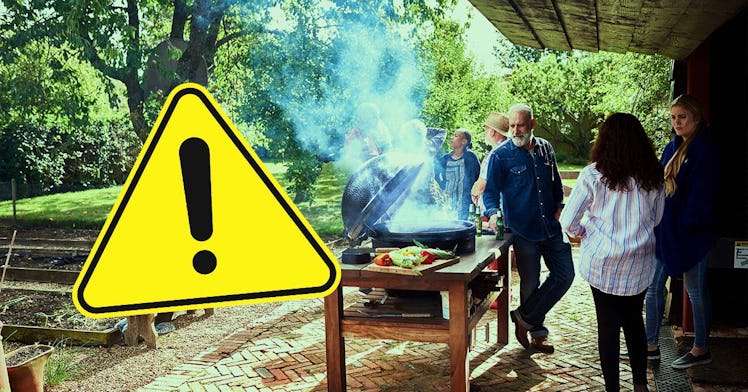Summer Safety Tips for Backyard Cookouts With Kids
Ensuring a cookout ends with fond memories instead of first aid.

Summers are for food, friends, and late evenings. With nice weather and schedules that allow kids to stay up late and hopefully sleep in equally late, there’s plenty of backyard fun to be had. But parents need to make sure that the backyard BBQ ends with fond memories and not first aid. That means there are some summer safety tip sto keep in mind when it comes to cooking out.
Grill and Fire Safety
“Every year we see burns associated with grilling, especially toddlers who touch hot grills,” says Dr. Christina Johns, Senior Medical Advisor at PM Pediatrics. She notes that kettle grills especially attract little kids because they tend to be visually appealing and lower to the ground. “There’s something about that reflective round shape that kids want to go up and touch, which is just the nature of developmental pediatrics.”
And as necessary as it is to keep kids away while using a hot grill, it’s equally as crucial to completely clean the area when you’re done. “People don’t do a terrific job at walking those hot charcoal briquettes and embers far enough away at picnic areas,” notes Johns. “When they aren’t disposed of properly, that can not only cause significant fire, but is also a hazard for young toddlers who might run around and step on them.”
Dr. Johns also encourages parents to closely supervise children around fire-pits. While some designs have insulated ledges, others can get hot enough to cause burns if touched with bare skin. “I always worry any time kids are leaning into anything because they are just not that coordinated,” she says. “And kids can physically fall in, so even if the surface isn’t hot, there’s still potential for an injury.”
Fireworks Danger
“We regularly see patients with burns to their hands, palms of their feet, and eyeballs, as well as other eye globe injuries,” says Johns. She notes specifically that the eyes, hands, feet, and genitalia are the worst places to get burned because not only are they incredibly sensitive, but they also don’t heal particularly well. “Those areas are the most prone to cause contractures when burns heal, where you get scarred down and lose range of motion. And obviously, we only have two eyes, so it’s not like we have the margin to spare.”
Projectile fireworks such as bottle rockets and roman candles have well-earned reputations for being dangerous. Still, even the sparklers that parents hand to little kids have the potential to cause serious injuries. According to the Illinois Fire Safety Alliance, common sparklers can reach a temperature of 1,800 degrees, far hotter than the 900 degrees it takes to melt glass or even the 1,200-degree melting point of aluminum.
The Hidden Danger of Food Poisoning
The repercussions are less immediate than with burns, but foods left out too long pose a significant risk of food poisoning. “The general guideline is that hot foods or dishes with mayonnaise or raw eggs, should not be left out for more than two hours,” warns Johns. “Otherwise, you run the risk of toxins in the food. And food poisoning is caused when those endotoxins get into your gut.”
Setting a timer on your phone or watch when you start serving a quick and easy way to make sure it doesn’t stay out too long. Preassembled salads, sandwiches, and any dish with dressings or sauces are particularly problematic, so keeping dishes simple can decrease the chances of food going bad. And fruits, vegetables and dry goods like crackers are great options to leave out for people to snack on because they hold up better over extended periods.
Dr. Johns also notes that many of the safety considerations parents have for their children also apply to family pets. “We have to be careful about our pets potentially getting burned and about them getting into the bad food as well,” she says. Because while your toddler will usually have the good sense to stay away from the food you’ve thrown away after it’s been left out too long, the same can’t necessarily be said for your canine and feline companions.
This article was originally published on